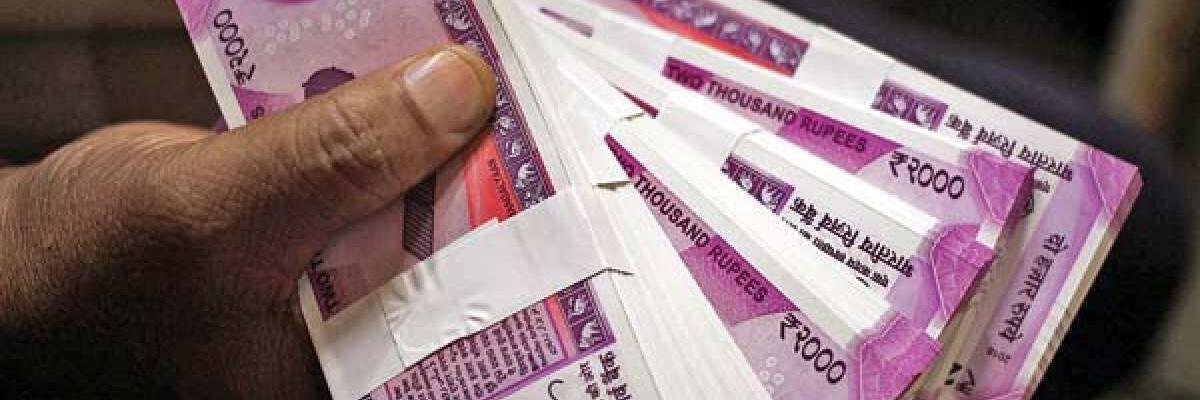7000 rich duped banks and left India!

It is reported that between 1998 and 2018, around three lakh farmers committed suicide in our country, often by drinking pesticides themselves Sainath, P Indias agrarian crisis has gone beyond the agrarian The Wire They felt ashamed to live in the midst of their friends and relatives for their failure to pay back
It is reported that between 1998 and 2018, around three lakh farmers committed suicide in our country, often by drinking pesticides themselves. (Sainath, P. "India's agrarian crisis has gone beyond the agrarian". The Wire). They felt ashamed to live in the midst of their friends and relatives for their failure to pay back. They lived by and died in the agricultural fields believing in mother earth, but did not leave motherland like 7000 rich, educated corporate industrialists who cheated the nation by evading thousands of crores. Farmers proved that they are real patriots as they valued the duty to pay back nation’s money as higher than their living.
In every election, the political parties woo the voters with promises of farm loan waiver, some of them rode to power and few fulfilled promises. Surprisingly, the defaulters of small amounts like farmers are defamed in public, while the defaulters above Rs 50 crore are given a long rope, high concessions in the name of one-time settlements, interest waivers, several other privileges and their names are hidden from exposure to secure their reputation!
According to the RBI, just 12 companies are estimated to account for 25% of the gross NPAs, and were identified for immediate bankruptcy proceedings, while there are 488 others which have been given six months’ time to restructure their debt or be dragged to National Company Law Tribunal (NCLT). A newspaper gave list of 12 companies and their loan defaults or bankruptcy details. A media report said that Reuters news agency has collected RBI data through RTI and concluded that country’s bad loans have hit a record high of Rs 9.5 lakh crore at the end of June 2017.
Another media report says: As on September 30, 2017, more than Rs 1.1 lakh crore was owed to banks by “wilful defaulters”. There are more than 9,000 such accounts for which banks have filed lawsuits for recovery and found that the top 11 debtor groups, each with dues of over Rs 1,000 crore, together had over Rs 26,000 crore outstanding to the banks.
After several BANK officials were arrested in Rs 11,400 crore PNB scam, the All India Officers Confederation (AIBOC, with membership of three lakh officers) has posed a challenge to the Central government to publish names of the wilful defaulters of all banks.
AIBOC also demanded that the banks be given liberty to write to the Home Ministry to take over the passports of directors of defaulting companies for emigration clearance to prevent their escape. AIBOC asked why the Reserve Bank of India (RBI) was hesitating to publish the list of defaulters like Vijay Mallya, Nirav Modi and Mehul Choksi and why they were allowed to leave the country. AIBOC questioned banks, the way they are writing off loans of thousands of crores every year in favour of these corporate bodies, which itself could be a major scam.
The apprehensions of AIBOC were confirmed by media’s analytical reports. One report last year says about 7,000 millionaires shifted their residence outside India, or changed their citizenship, leaving the banks, economy of the nation, public exchequer and public sector banks bleeding. An internet news portal gave, on 19th February 2018, the list of defaulters who escaped from our country changing citizenship. In March 2018, Minister of State for External Affairs MJ Akbar stated in Parliament that 31 business people facing CBI investigation have flown out of country. After the Nirav Modi case, the Central Board of Direct Taxes (CBDT) set up a five-member working group to examine the exodus and their taxation aspects.
The Fugitive Economic Offenders Ordinance in April, 2018 was passed. A committee headed by Financial Services Secretary Rajiv Kumar, with representatives from the RBI, the Ministries of Home and External Affairs, the Enforcement Directorate (ED) and the Central Bureau of Investigation (CBI) has recommended stopping wilful defaulters with loans exceeding Rs 50 crore from travelling overseas without prior approval. In March, banks had been directed to seek the passport details of borrowers taking loans of Rs 50 crore and more. The website reported that for quarter ended June 30, 2018, 3,385 suits were filed against defaulting companies that had wilfully defaulted on loans of Rs 25 lakh and above - amounting to a whopping Rs 57,523.90 crore. The Finance Ministry had also directed PSBs to examine all NPA accounts of over Rs 50 crore for possible fraud and accordingly report the cases to concerned investigating agencies, including CBI, ED and DRI, if any wrongdoing was detected.
The Financial Stability Report, 2017, released by the RBI, states that India’s gross NPAs stands at 9.6%. Finance Minister answered in Lok Sabha on August 11, 2017, that the gross NPAs of public sector banks increased by 311.22% from Rs 1,55,890 crore in 2013 to Rs 6,41,057 crores in 2017. According to the rating agency CARE, as of June 2017, State Bank of India leads the list of scheduled banks with the highest NPAs with Rs 1,88,068 crore of stressed assets. Punjab National Bank and IDBI Bank follow suit with Rs 57,721 crore and Rs 50,173 crore of gross NPAs respectively. However, among Indian banks, IDBI Bank, which has 24.11% gross NPAs, tops the list for lending institutions with the highest exposure to liabilities. Indian Overseas Bank has 23.6% NPAs while fellow private lenders like Kotak Mahindra Bank and HDFC had only 2.58% and 1.24% gross NPAs. State Bank of India has a gross NPA ratio of 9.97%.
The RBI has issued a Master Circular regarding wilful defaulters on June 30, 2015. It says that pursuant to the instructions of the Central Vigilance Commission for collection of information on wilful defaults of Rs 25 lakh and above by RBI and dissemination to the reporting banks and FIs, a scheme was framed by RBI with effect from 1st April 1999 under which the banks and notified all India Financial Institutions were required to submit to RBI the details of the wilful defaulters. This recommended criminal action by banks under Sections 403 to 415 of Indian Penal Code, which deal with cheating.
Ministry of Corporate Affairs had introduced the concept of a Director Identification Number (DIN) with the insertion of Sections 266A to 266G in the Companies (Amendment) Act, 2006. In order to ensure that directors are correctly identified and in no case, persons whose names appear to be similar to the names of directors appearing in the list of wilful defaulters, are wrongfully denied credit facilities on such grounds, banks/FIs have been advised to include the Director Identification Number (DIN) as one of the fields in the data submitted by them to Credit Information Companies. Yet they refuse to reveal the names of the defaulters. It is surprising that the RBI and the government of India are fighting CIC to protect these financial criminals.

















